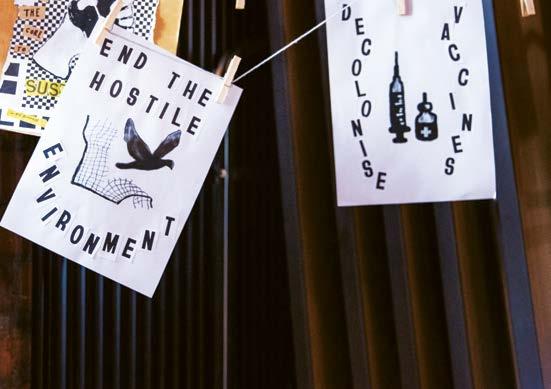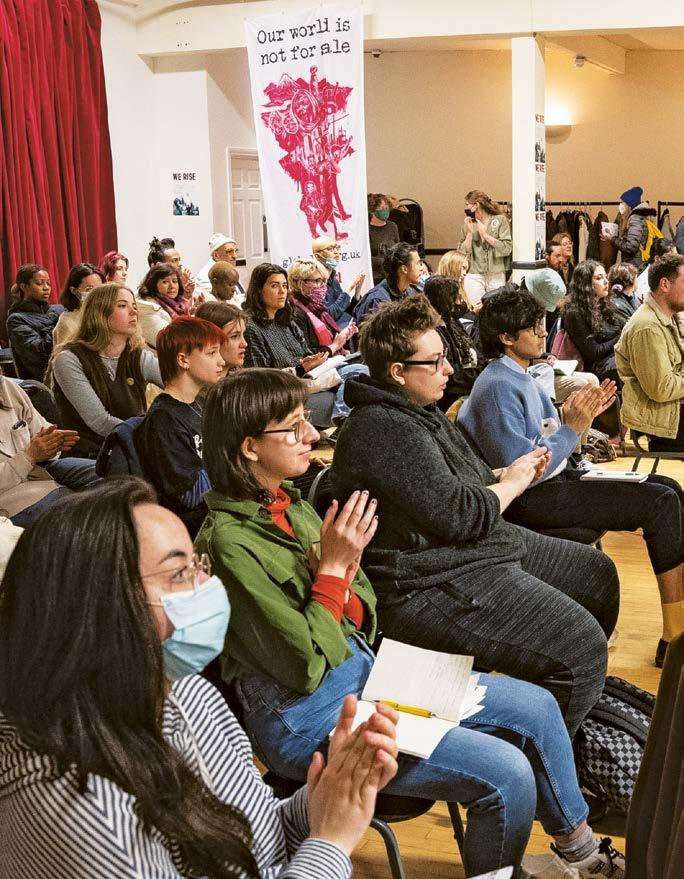Impact Report 2022



Global Justice Now strives to fundamentally change the global economic system and create a world where people are valued before profit.

Thank you for being part of the movement for justice.







Global Justice Now strives to fundamentally change the global economic system and create a world where people are valued before profit.

Thank you for being part of the movement for justice.



“We’re now 40 years into the experiment of letting giant corporations accumulate more and more power...I believe that experiment failed.” These are unlikely words from the once champion of corporate trade deals and mainstream Democrat, Joe Biden. But they show that something big has changed. There is today a growing recognition that the power of obscenely wealthy corporations is so immense that it threatens the stability of society itself.
The political status quo is shifting, and this should give us hope that we can push further, towards the transformational change we need.
In 2022, we pushed against the power of big pharmaceutical corporations, which generate massive profits by privatising and monopolising knowledge. We fought for a different model, where shared knowledge forms the basis of

a fairer medical system which meets the needs of all. In particular, we supported the cutting-edge South African mRNA hub which is creating its own Covid-19 vaccines and sharing the know-how patent-free with countries across the world.
At the UN climate summit (COP27), we pushed to hold big fossil fuel corporations to account. As part of a broad movement, we demanded the creation of a ‘loss and damage’ fund, a recognition after many years that those who caused climate change must pay to deal with the problems it is causing. We won, and now have an opportunity to make sure the big fossil fuel corporations pay up.
And we campaigned against the way big corporations have embedded their interests in trade deals. One of the biggest of such deals, the Energy
There is a growing recognition that the power of obscenely wealthy corporations is so immense that it threatens the stability of society itself. This should give us hope that we can push towards the transformational change we need.
Charter Treaty, exists to protect the interests of energy corporations. But, after years of tireless campaigning, the treaty is crumbling before our eyes, with country after country pulling out of the toxic deal.


In these difficult times, signs of hope are often obscured by unrelenting negative news which suggests we simply can’t beat the vested interests holding our society to ransom. We hope this 2022 review will help rekindle your energy, and prove yet again, that together, we can change things.



Thank you for being part of the movement for change.
Nick Dearden Director of Global Justice NowAs the global climate crisis intensifies, we need to remove all the obstacles to a low-carbon future. That’s why in 2022 we stepped up our campaign to stop trade deals from blocking climate action.
Right now, most modern trade deals include legal access for big corporations, like fossil fuel giants, to a climate-wrecking ‘corporate courts’ system. This allows them to sue governments across the world for billions for taking action on the climate emergency if they deem it might harm any of their future profits.
Last year we celebrated a big win for the climate and people facing the brunt of climate change. In March the UK government announced that corporate courts were not going to be part of the new UK-Canada trade deal. And at the end of November, country after country, including Germany, France and Spain, declared that they were exiting the Energy

Charter Treaty (ECT) – another big trade deal between around 50 countries. As a result, the ECT is now on its last legs, and we hope this might be the beginning of the end of the whole corporate courts system – if we keep fighting!
This campaign success is down to a movement of like-minded people pushing for change. In May we organised a national day of action, highlighting the corporate court case filed by Uniper against the Dutch government for phasing out coal, and UK oil and gas company Rockhopper which sued the Italian government after it introduced a ban on offshore oil drilling. We also worked with Colombian groups to resist a huge corporate court lawsuit against their government and coordinated a global statement on

corporate courts and climate signed by more than 400 organisations from 60 countries, which was launched at the UN climate conference, COP27.
Working in Westminster and with MPs to push for change was also a key part of our trade work in 2022. We flagged problems with the UK-Australia trade deal and supported the International Trade Committee in parliament in its efforts to get a proper democratic debate on the agreement – although this was refused by the government. We submitted evidence on the devastating environmental impacts of UK trade policy and corporate courts to consultations from parliament and the Organisation for Economic Co-operation and Development.
Following the huge success of convincing several European countries to leave the Energy Charter Treaty (ECT), early this year both the European Parliament and the Commission started discussing a coordinated withdrawal. Now we want to make sure the UK government follows suit. That’s why we are now focusing on working with UK MPs across the political spectrum. We will make sure politicians are presented with the latest in-depth research and case studies on why exiting the ECT is a necessary step for global climate justice.
Trade policy and campaigns manager
At the end of the year, it was amazing to see country after country exiting the Energy Charter Treaty and know that it was the result of two years of solid campaigning by Global Justice Now activists and allies all across Europe.
As the ECT begins to fall apart, we’re looking at how we can connect with allies across the world to raise further international awareness about the climate-wrecking corporate courts system and bring it to an end for good.

Imagine a world where, in the midst of a deadly global pandemic, a few giant corporations decide who receives life-saving treatments – and who doesn’t. All while raking in billions in profits.
It might sound like pure science fiction, but since the start of the Covid pandemic pharmaceutical giants like Pfizer and Moderna have bluntly refused to share vaccine know-how, even as millions of people died of the virus. And sadly, this is not a one-off. Big pharma repeatedly hikes prices and builds patent-protected fortresses around life-saving medicines across the world.
In 2022 we made some important progress. Thanks to the financial backing of our brilliant supporters, in October we took a media and parliamentary delegation to the groundbreaking mRNA vaccine technology transfer hub in South Africa (pictured left).

Scientists at the hub have already reverse-engineered Moderna’s Covid-19 vaccine and shared their know-how with low- and middle-income countries. And they are now working on treatments for other diseases hitting the global south the hardest. Our visit generated strong media coverage and the hub is now starting to get backing in the UK parliament.
Our campaign for a suspension of patents on Covid-19 vaccines hit the headlines in January when we brought together 300 scientists to back the call. And again when we gathered outside Pfizer’s UK headquarters to expose their shocking ‘pandemic profiteering’ as they celebrated record revenues. After two years of delaying tactics by rich countries including the UK, a limited
My highlight: Tim Bierley

deal on vaccine patents was finally reached at the WTO in June. While it was too little, too late for the many who lost their lives without access to a vaccine, it was a significant moment of global agreement that the current patent regime has failed. Now it is up to us to build the case for a new pharma system. Big pharmaceutical companies have certainly noticed our campaign. In December we learnt that at the height of the pandemic BioNTech, the company which developed Pfizer’s extremely profitable Covid-19 vaccine, contacted Twitter to pressure them into hiding our activists’ tweets calling for generic Covid vaccines to be produced. This year we will show BioNTech and the rest of the big pharma lobby that we’re not backing down.
In 2023 we’re excited to launch a series of short films about the failures of the pharmaceutical industry. Working with patient activists, health workers and campaigners, we’ll tell the personal stories of the people who are fighting back. We’ll be sharing the films online and then organising screenings across the country later in the year.

We’re also working to persuade the UK’s political parties to change the way drugs are researched and produced, supported by new research that will show how pharmaceutical corporations rip off the NHS, and public health systems globally.
Visiting the South African vaccine hub in October was so galvanising. Everyone we met was determined to share science across borders so that diseases affecting the global south are no longer ignored.
The mRNA vaccine technology transfer hub in South Africa is a great example of how to move beyond the profiteering model of patent monopolies. We’ll be working to build support for this approach and ward off big pharma’s attempts to undermine it.
Radical action is needed to tackle the climate emergency, and the biggest historical polluters must take the lead. So, together with our supporters and allies, Global Justice Now is demanding that the governments and corporations which have done most to cause the climate crisis pay to avert it.
Last year we increased our efforts to demand that rich industrialised countries pay their fair share in ‘climate reparations’ to countries most impacted by and least responsible for climate change. As the fossil fuel industry’s emissions and profits continue to climb dramatically, we want governments to tax these companies to pay for the loss and damage sustained by countries at the sharp end of the climate crisis.

To raise awareness of the need for reparations, we organised a speaker tour with the former lead negotiator for the global south at UN climate talks, Lumumba Di-Aping. We hosted public events, parliamentary meetings with MSPs and MPs, and a panel on reparations at our national gathering in Sheffield with expert and activist Esther Stanford Xosei. Our climate campaigners appeared on Channel 5’s Jeremy Vine Show and BBC Radio Scotland to condemn BP’s sickening profits and to demand polluters pay for climate damage in the wake of Pakistan’s devastating floods.
In September we joined with allies for a loss and damage action day across the country, standing in solidarity with those demanding climate reparations. We were clear in our message that the UK government needs to stop blocking and start supporting a loss and damage fund for the global south at UN climate talks.
responsible for an estimated $8 trillion of climate damages in the global south, even as they report a combined annual profit of $170 billion. This research was covered in an exclusive by iNews as well as other media. We also appeared on Sky News, BBC Radio and Times Radio to discuss the need for heads of state to take urgent action to make polluters pay.
Most importantly, at COP27 itself representatives from global south countries, backed by the wider climate justice movement, won a loss and damage fund after three decades of efforts. Now, as part of the Make Polluters Pay coalition, we will work to make sure the fund is set up properly and that polluters pay their share.

While it has been agreed that the loss and damage fund will be established, the details are yet to be decided. Between March and COP28 in November this year, there will be an ongoing UN process to decide on the terms of the fund. As billions are facing the effects of the climate crisis, we will continue to take action and demand polluters pay for the damage they’ve caused and for the UK to make a substantial contribution to the loss and damage fund.
Ahead of COP27 in Egypt in November, we published research exposing how the biggest 5 oil companies – BP, Shell, ExxonMobil, Chevron and Total – are
My highlight: Dorothy Guerrero Head of policy and campaigns
Getting the loss and damage fund agreed at COP27 was a major breakthrough. A win for the whole movement after three decades of solid campaigning.


The international debt system has been described as a ‘debtor’s prison’ – a system that massively favours rich countries and big banks. Despite a global pandemic and devastating climate impacts, big banks making billions in profits every year continue to collect debt payments from the global south, ignoring international calls to offer debt relief. That’s why we keep pushing the UK government, by working with parliamentarians and like-minded organisations, to support debt justice and cancel the debt of lower income countries. We held two actions outside the headquarters of private lender BlackRock, demanding it cancels Zambia’s debt as the country continues its struggle for public health and climate adaptation.



At a time when people globally are struggling to make ends meet, the UK government is planning to rip up many of the banking regulations introduced after the 2008 financial crisis. Rishi Sunak wants to remove rules brought in to restrain City speculators from gambling on the price of food and energy and remove the cap on bankers’ bonuses.
After the last financial crisis, we successfully exposed how big banks and hedge funds had been taking advantage of unregulated financial markets, excessively betting on food prices and artificially driving up costs. As a result of tireless campaigning at the time, some regulations were introduced to rein this in. While these new laws were not enough, they were a step in the right direction.
That’s why we dedicated part of our work to call on the UK government to reverse plans in the Financial Services and Markets Bill to water down laws put in place to avoid another financial crash. Thanks to tens of thousands of our supporters taking action, we managed to get the issue raised in the media and in parliament. We are continuing to push parliamentarians to support an amendment to scrap the government’s proposal to drop rules to constrain commodity speculation.
At Global Justice Now we have a history of campaigning for a better and more humane immigration system. Whether people migrate to flee wars, escape poverty or simply to be closer to loved ones, everyone deserves to be treated with respect and dignity. In 2022, we played a part in establishing Action Against Detention and Deportation (AADD), a grassroots network of activists and organisations campaigning against current government immigration policies. Drawn together over the introduction of the Rwanda deportation scheme in the summer, AADD was pivotal in highlighting the disgraceful treatment of asylum seekers at Manston processing centre in Kent, which became a national scandal in November.
We believe big change comes from resilient, empowered and informed movements which consistently demand a better world. After two years of Covid restrictions we were excited to return to in-person events this year.
As things moved back to a ‘new normal’ in the spring, youth groups in Stirling, Newcastle, Leeds, Manchester and Brighton co-organised Decolonise Vaccines, a speaker tour featuring health campaigners from South Africa and Kenya in eight locations across the UK.
We Rise, our national youth network conference in London in April, was a real success and showed how important in-person events are for our movement. Over 100 young people came together to discuss access to vaccines, trade, and climate reparations with incredible speakers, insightful workshops and joyful performances.

In the first part of the year campaigners and activists were gearing up for a Europe-wide day of action against the Energy Charter Treaty (ECT) calling on the UK to exit this climate-damaging trade deal. Global Justice Now groups organised protests around the country, including at the Uniper power plant in London, and at the Glasgow offices of a law firm which takes corporate court cases. The ECT, trade deals and climate were also among the main topics discussed at the Attac European Summer University in Germany where activists from across Europe, including Global Justice Now campaigners and others, came together in August.
This year’s national activist gathering was held in Sheffield. Hope in the Dark, a fantastic day of workshops and panel discussions, featured Lumumba Di-Aping, former lead climate negotiator for global south countries, and Farooq Tariq, general secretary of a Pakistani rural workers union, talking about the case for climate reparations.
Throughout the year our local groups were also busy running stalls on vaccine access, the ECT and loss and damage, as well as organising local speaker events and lobbying their MPs. And we also mobilised for marches for climate justice around the country during COP27 in November, with a significant presence on the protests in London, Sheffield and Edinburgh.
Right at the start of this year and building on the success of last year’s youth gathering we held another We Rise, this time in Manchester. Together we unpacked how colonialism, capitalism, hostile border regimes, and corporate power have created vast inequality, and how we organise to end it. At the end of March, we organised Resisting Monopoly Capitalism, another major activist conference about extreme corporate power on a planet in crisis.
My highlight: Natalia Uribe

Youth activist
Activism is about community building. The range of the events this past year have shown me that there’s no limit to what a community can build, do and fight for.
We’re now planning a youth network summer gathering in Sussex to bring key activists together for a whole weekend to skillshare and organise for the year ahead.

In order to maximise pressure on decision-makers and build a strong movement in the UK for global justice, we work with activists and parliamentarians across Scotland. And last year our campaigning in Scotland made headway in our struggle for access to medicines for all.
In June, as a result of our lobbying, the Scottish and Welsh governments made a joint statement in support of the global campaign for vaccine equality and the call for a waiver on patents on Covid-19 vaccines to make them more affordable and accessible globally. This was in stark contrast to the opposite position being taken by the UK government in Westminster. In the autumn, we took our campaign to the SNP conference with a well-supported fringe meeting on vaccine equality.

Our campaigning on climate justice in Scotland kept up the momentum from the Glasgow climate summit the previous year, as we exposed the need for reparations to be paid to countries in the global south which are suffering the worst impacts of climate change. As the latest UN climate talks happened in Egypt, we helped organise a march for thousands of people through Edinburgh as part of the national day of action to make polluters pay for the climate chaos they have caused. And we hosted events with South Sudanese campaigner, and former UN climate negotiator, Lumumba Di-Aping to increase public awareness of the urgent need for reparations.
Scottish campaigners also successfully highlighted the link between global south debt, international trade deals and the struggle for climate justice. Coinciding with similar actions in London, we organised a stunt outside BlackRock’s office in Edinburgh to pressure the private lender to cancel debts of global south countries such as Zambia, struggling with climate impacts and the aftermath of Covid-19. Global Justice Now activists in Scotland also organised a protest at the offices of international trade lawyers Clyde and Co in Glasgow as part of the UK day of action to highlight the threat to climate action from the international trade deal, the Energy Charter Treaty.
The Scottish government has already publicly spoken out against corporate courts in trade deals, as a result of our campaigning, so we’ll now be putting pressure on them to go further and publicly oppose the Energy Charter Treaty.

The highlight of campaigning is, for me, so often about working together with our allies in the global south, to push back against corporate power and to promote positive alternatives. Hearing their experiences and campaigning together for the same things, but in our different local contexts, feels powerful.
We’ll also continue to lobby Scottish politicians and the Scottish government to support positive initiatives, like the South Africa vaccine hub, that are challenging the profitdriven pharmaceutical system and will give greater access to affordable medicines in countries in the global south.

Collective action is the best way we can shift the balance of forces in society to bring about the structural change we need.
Our movement made some incredible progress during 2022, from almost unimaginable breakthroughs in our fight against the damaging Energy Charter Treaty to a loss and damage fund being agreed at COP27.
Nothing can change without the support of our members and activists. Your donations and ongoing commitment to our work during yet another turbulent year enabled so many small but important steps forward. And for this we are incredibly grateful.

We’d also like to thank like-minded trusts and faith groups for their collaboration and support during 2022, making our campaigns bigger and stronger.
Thank you from all of us in fundraising and supporter care.
Gifts in wills form a significant part of our income, helping to fund our vital campaigns. By leaving a gift in your will to Global Justice Now, you can be sure you’ll make a difference long into the future, helping to fight for what you believe in.
If you would like to find out more about leaving a gift in your will, please visit globaljustice.org.uk/leave-gift-your-will or email Eleanor.Williams@globaljustice.org.uk
Most of our income in 2022 (74%) directly supported our campaigns and activism, raising awareness in the media, publishing research, influencing decision-makers or mobilising activists and members of the public to take action with us.
Part of our income (24%) was used to report back to our supporters, communicate our campaigns to the wider public and to raise funds, to ensure we can continue to challenge injustice. 2% went towards the governance of Global Justice Now, ensuring democratic oversight of the organisation.
Campaigns


Fundraising and communications Governance
These amounts have not yet been audited
Other donations from individuals
£1,735,000 Expenditure
Other incomes
Income
Grants (restricted)
Regular giving donations from individuals Grants (unrestricted)
Faith-based organisations
Legacies
To find out more or ask a question, get in touch at: Global Justice Now, 66 Offley Road, London SW9 0LS
020 7820 4900 • offleyroad@globaljustice.org.uk

www.globaljustice.org.uk • @GlobalJusticeUK

Global Justice Now • @globaljusticenow
Global Justice Now: company no 2098198. Global Justice Now Trust: registered charity no 1064066, company no 3188734
Front cover image © Léo Bodelle, back cover © Jess Hurd. All other photos by Global Justice Now unless credited otherwise. Design and layout: www.causeffectdesign.co.uk